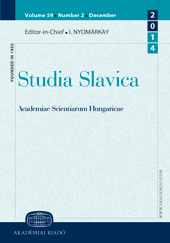О двух бродячих словах восточного происхождения
в древнерусском языке
Two Oriental Descent Words in the Old Russian Language
Author(s): Klára AgyagásiSubject(s): Eastern Slavic Languages
Published by: Akadémiai Kiadó
Keywords: Russian vocabulary; oriental elements; Middle Kipchak loanwords; West Old Turkic loanwords; Chinese loanwords; Middle Mongolian intermediation
Summary/Abstract: The author presents a historical-etymological analysis of two Russian words – kunžut ‘sesame’ and xamovnik ‘weaver’. According to her argumentation, Russian kunžut has Tokharian origin, it was borrowed from Tokharian A by Old Uygur before the 12th century. From Old Uygur, it was intermediated by Middle Mongol and Middle Kipchak to Russian. Xam, the stem of xamovnik is preserved in one of the Old Novgorodian birk barch letter from the beginning of the 14th century. It was borrowed from the Cantonese dialect of the Chinese language by West Old Turkic, and a West Old Turkic form was borrowed by Old Russian.
Journal: Studia Slavica Academiae Scientiarum Hungaricae
- Issue Year: 63/2018
- Issue No: 1
- Page Range: 1-8
- Page Count: 8
- Language: Russian
- Content File-PDF

